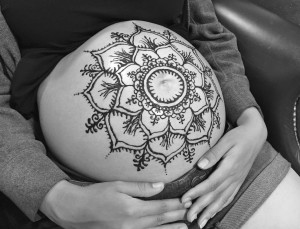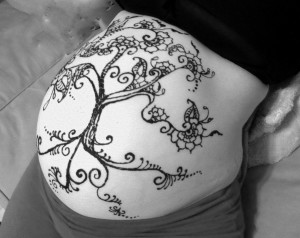 Baby Belly Henna Tattoos:
Baby Belly Henna Tattoos:
Would you like to celebrate your beautiful growing baby bump? Or are you, perhaps, feeling a bit unsure about the changes that are happening to your body during your pregnancy? Either way, applying henna can be a wonderful way of embracing your body, boosting your confidence, creating an emotional connection with other women or your doula (if you have chosen me to attend your birth) and helping you feel beautiful when you are at your largest size! You can book a private appointment with me to apply your Baby Belly Henna Tattoo, or alternatively, I can attend your baby shower and apply temporary henna tattoos to you and your guests. Please contact me for further details.
More About Henna Tattoos:
Adorning the body with henna prenatally or postpartum is a common practice within many cultures throughout South Asia, North Africa and the Middle East. Applying henna during this biologically and socially significant time in a woman’s life serves several purposes. Prenatally, henna is usually applied towards the end of pregnancy, by female friends and family members of the mother-to-be. These are often the same women who will attend her birth and provide her with support once the baby is born. Applying henna is often part of other rituals which are meant to ensure the protection and well-being of the mother and child. In the postpartum period, applying henna and the accompanying rituals, are ways of ensuring that the new mother rests and feels supported. Since applying the henna can be time consuming, the new mother must sit still and let others do her regular chores. Having her sit still to apply the henna, ensures she recuperates from the birth and devotes her energy to bonding with her newborn. This rest and relaxation period is often extended since she is usually encouraged not to resume her regular duties until the henna tattoos have worn off her hands / feet so that she will not “spoil the beauty” of the tattoos. It is interesting to note that regions with henna traditions surrounding childbirth are also regions with low rates of postpartum depression.
My purpose in offering henna application is to enhance the care that I provide to my doula clients. Applying henna can be a great way to “get to know you” during our prenatal appointments and the time that we spend together during the henna application can facilitate rest, relaxation and support for you. Beautifying and celebrating your body as it expands in the prenatal period and contracts again in the postpartum period also helps to create a positive self-image during these times of change. Sadly, our culture often encourages us to see these changes in a negative light, due to the emphasis on achieving a thin figure and quickly “bouncing back” to exactly the way we were before birth in the postpartum period. In my work, I like to encourage expectant women and new mothers to challenge these beauty ideals and feel good about the amazing feats their bodies have accomplished. To view some of my previous work, please visit the Baby Belly Gallery.
Henna Safety:
Yes, applying henna tattoos to your body during pregnancy is safe! I only include 3-4 naturally-derived ingredients in my henna paste: henna powder (ground up henna leaf), lemon juice, sugar, and lavender essential oil. The essential oil is optional, but I like to include it because it helps to achieve a darker stain more rapidly.
The Process:
The use of the word “tattoo” to refer to henna stains is somewhat misleading. Henna does not create a permanent image on the skin. It is a temporary stain that typically lasts from 1-3 weeks.
First, I mix the paste and put it in a cone with a small hole at the end. You will select the pattern you would like and I use the cone to draw the henna pattern on your body. Once the paste is applied, I use a hairdryer to help it dry more rapidly. Then I usually seal it (optional) by applying a hairspray or lemon/honey glaze. This helps the henna to stay stuck on your skin. Next, we wrap the tattoo up with a cloth to protect your clothes and the pattern. You should keep the paste on overnight or for several hours (around 8 is preferred). After the paste has set the stain, you can wash the paste off and you will be left with a henna stain (aka “tattoo”). The stain colour depends on your skin tone and can be orange, red or brown. The colour darkens over time after the application of the henna, and it will be darkest three days after you have washed the henna paste off.
